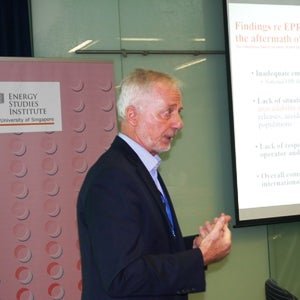Information
Venue
Start
End
ESI-CIL Nuclear Governance Project
25 July 2016 | Joint Seminar
Emergency Preparedness and Response in the Aftermath of Fukushima – International Public Policy and Legal Challenges
Introduction

The Energy Studies Institute (ESI) and the Centre for International Law (CIL) jointly organised a seminar on ‘Nuclear Off-site Emergency Preparedness and Response in the Aftermath of Fukushima: International Legal and Public Policy Challenges’, as part of the ESI-CIL Nuclear Governance Project. Professor Günther Handl, P. Deutsch Professor of Public International Law at Tulane University Law School and an expert in nuclear law, spoke on (i) Fukushima’s Emergency Preparedness and Response (EPR) problems and the generic lessons that can be drawn; (ii) why national EPR is a matter of intrinsic international concern; (iii) the current international legal regime bearing on off-site EPR; and (iv) Fukushima’s specific implications for EPR policy and law. The seminar was chaired by Dr. Philip Andrews-Speed, Principal Fellow at ESI. The seminar was attended by 30 participants from academia, government, law firms and industry and was held at ESI on NUS Kent Ridge Campus on 25 July 2016.
The accident at the Fukushima-Daiichi nuclear power plant, much like Chernobyl before, is a stark reminder of the critical role of off-site emergency preparedness and response (EPR) in nuclear accident management notwithstanding continuous improvements in nuclear safety worldwide. EPR is a matter of intrinsic international concern, not only between neighboring States, but globally as shortcomings in EPR anywhere tend to undermine confidence in nuclear safety everywhere. Post-Fukushima, EPR therefore has been a focal point of international regulatory attention which this seminar set out to describe in the context of nuclear accidents with radiological off-site effects. The seminar first discussed the international normative setting for EPR, principally the IAEA-centered framework (including relevant conventions, safety standards, operational arrangements and services). It then addressed some of the major international public policy and legal challenges that have presented themselves in the aftermath of Fukushima: The drive to harmonise EPR and the intrinsic difficulties in reaching that goal; transboundary emergency notification/communication arrangements bilaterally, regionally and globally, that are insufficiently anchored to a firm legal basis; enhanced independent peer review and regular testing to ensure quality and reliability of EPR plans; and stronger State support for IAEA’s international emergency assistance mechanism. In the end, while EPR notionally remains, of course, a national responsibility, many of its key aspects are increasingly being ‘internationalised’.
About the Speaker
Professor Günther Handl is the Eberhard P. Deutsch Professor of Public International Law at Tulane University Law School. Professor Handl is an expert in nuclear law and has authored numerous publications relating to nuclear safety, security and liability. He has also advised the Nuclear Energy Agency (NEA) and was a consultant on the revision of the Paris Convention on Nuclear Liability. Professor Handl has served in various capacities in many international organisations, including the United Nations, the Organisation for Economic Co-operation and Development, the Asian Development Bank and the World Bank.


